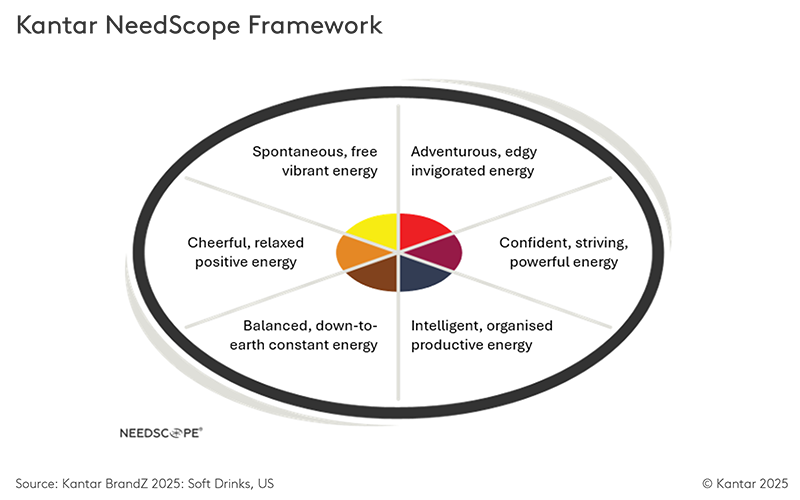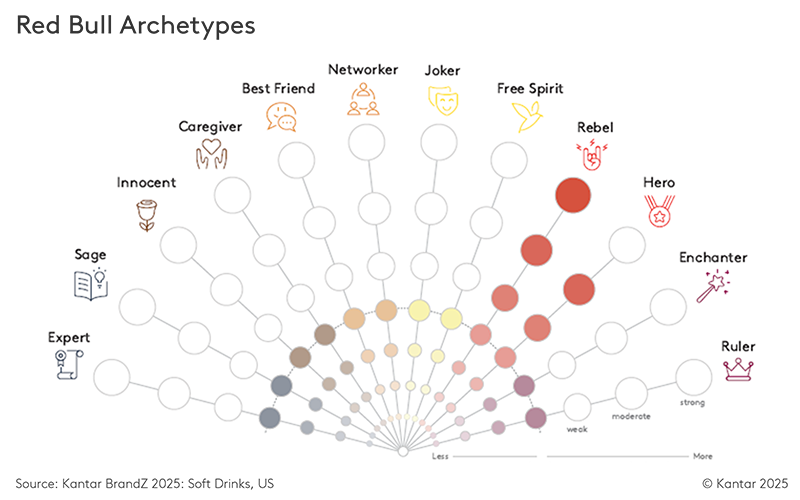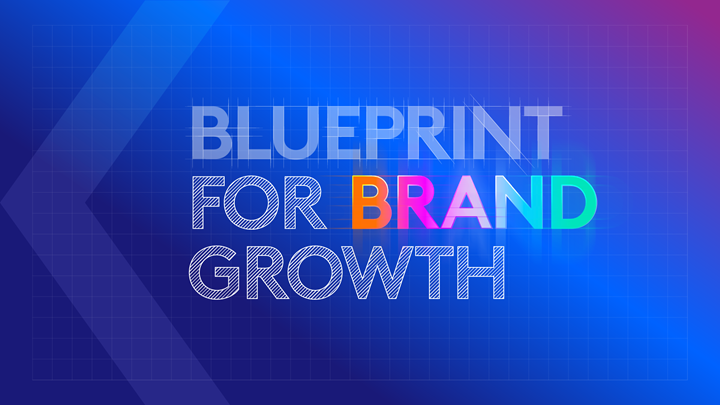Whether it’s expanding into a new region or overseeing a multi-brand portfolio, effective marketing increasingly depends on developing a clear understanding of positioning. How does your brand compare against its main competitors? Are there markets where it doesn’t resonate? What are the biggest misconceptions it faces – and how can these be addressed?
To stand out and stay relevant, marketers must be able to make confident, data-driven choices on issues like these – and do so regularly and rapidly. In theory, brand strategy should provide a reliable roadmap to support this capacity. But too often, it gets stuck in a cycle of cautious commentary, stable metrics, and incremental tweaks – with research taking substantial time and budget to deliver results.
When considering the best way to stay relevant, many marketers fail to appreciate the critical importance of emotion. While it’s widely accepted that this is an important factor in advertising, harnessing emotional engagement for brand positioning is different. Rather than seeking immediate responses, brands need to grasp how their unique characteristics intersect with consumer needs – then use this insight to build a consistent identity over the long term.
Red Bull exemplifies how emotional clarity allows brands to differentiate and drive value. Through its link to high octane sports events, memorable logo and distinctive flavour – the brand embodies a sense of adventurous, edgy and invigorating energy. This is seen in the Kantar BrandZ data for the US where Red Bull scores highest on Difference, defined by the way it shakes things up in a unique way. It is also strongly associated with the ‘Rebel’ archetype. By intentionally aligning its activity and identity with this emotional terrain, Red Bull has remained a strong performer in Kantar BrandZ’s top 100 index. The majority of brands, meanwhile, never achieve such impact: BrandZ data shows that 85% have not made a strong emotive connection with consumers.
What makes the difference is understanding which emotions to focus on – and for that, marketers need the right tools.
Kantar’s NeedScope framework uses universal psychological principles to map a category’s emotive landscape and explore how brands can locate themselves within it.

In this example, Red Bull captures the adventurous, edgy, invigorating energy in the Red territory. All of its brand associations support this, from its logo, advertising and sports sponsorships – as evidenced by the rebel/hero archetype associated with Red Bull in the Kantar BrandZ personality measures.

Source: Kantar BrandZ 2025: Soft Drinks, US
Compare this with its competitor Mountain Dew which Kantar BrandZ data for the US shows is strongly associated with the ‘Jester’ archetype – the spontaneous, free, vibrant energy in Yellow. Very different from Red Bull.
Other competitors could differentiate by developing associations around other territories which express a different kind of emotional energy.
With a solid understanding of different emotional territories and how it might occupy them, a brand can clearly define its Meaningful Difference.
By taking this approach over the long term, brands can build lasting emotional resonance. Equally, a more rapid analysis can help drive differentiation and refresh positioning on shorter timescales. This is particularly useful when facing circumstances that move faster than traditional research can handle.
Given this, alongside our bespoke insights, Kantar also offers agile NeedScope studies – providing high-level, standardised results in as little as fifteen days. These deliver vital support for marketers who need urgent guidance to inform their thinking.
How can a rapid study like this help your brand flourish? Here are five ways marketers can use an emotion-focused analysis to drive meaningful difference and make faster, smarter decisions.
When managing business-critical initiatives like entering new markets, or choosing brand partnerships the speed of decision-making is an important factor. Standardised, actionable insights on positioning and emotional impact give marketers the context they need to make the right calls with confidence. For example, Red Bull’s partnership with GoPro makes intuitive sense when you consider this is based on shared brand values of adventure, action and spontaneity. The chemistry fits. But to be at this point you first need to know your brand at a deeper emotional level. No one has the luxury to start thinking about their brand strategy from scratch every time they need to make decisions like this.
2. Get to grips with relative difference
Poor differentiation often has its roots in the lack of a distinctive emotive identity.
A rapid positioning study, including a gap analysis, can help brands better understand how they compare to their competitors – empowering them to change course if they need to.
3. Sharpen multi-brand portfolios
The bigger the portfolio, the greater the risk of overlap and cannibalisation. Clearly defining emotional connections helps each brand within the portfolio carve out a distinct role – driving stronger consumer preference and supporting long-term growth.
4. Refresh to stay relevant
There are many ways a brand can lose relevance. Market dynamics might shift, or a positioning study could become outdated. Rapid insights allow marketers to refresh a brand’s emotional territory quickly and cost-effectively, keeping it in line with consumer expectations. Old Spice illustrates this well, with a tonal shift a few years back – away from traditional, older-generation product associations into a fresh, light-hearted and more relevant positioning appealing to younger audiences.
5. Enhance your existing tracker
In-depth and rapid positioning studies complement each other. An agile solution can work alongside your current tracking programme to support more informed decision-making without stretching budgets or timelines – resulting in effective short-term guidance while keeping sight of the bigger picture.
In many situations, speed also matters – so the faster brands can clarify their approach, the better.
To drive Meaningful Difference, brands need to gather the right data and then use it intelligently to guide action. Agile tools available across Kantar solutions offer an accessible way to understand and deepen their emotional impact. With these insights, they can develop sharper positioning and stronger emotional connections – and as a result, make faster, more confident decisions.
Find out more about how you can get insights to support better brand positioning from months to weeks while maintaining grounded in solid foundations. Get in touch today.
To stand out and stay relevant, marketers must be able to make confident, data-driven choices on issues like these – and do so regularly and rapidly. In theory, brand strategy should provide a reliable roadmap to support this capacity. But too often, it gets stuck in a cycle of cautious commentary, stable metrics, and incremental tweaks – with research taking substantial time and budget to deliver results.
When considering the best way to stay relevant, many marketers fail to appreciate the critical importance of emotion. While it’s widely accepted that this is an important factor in advertising, harnessing emotional engagement for brand positioning is different. Rather than seeking immediate responses, brands need to grasp how their unique characteristics intersect with consumer needs – then use this insight to build a consistent identity over the long term.
Red Bull exemplifies how emotional clarity allows brands to differentiate and drive value. Through its link to high octane sports events, memorable logo and distinctive flavour – the brand embodies a sense of adventurous, edgy and invigorating energy. This is seen in the Kantar BrandZ data for the US where Red Bull scores highest on Difference, defined by the way it shakes things up in a unique way. It is also strongly associated with the ‘Rebel’ archetype. By intentionally aligning its activity and identity with this emotional terrain, Red Bull has remained a strong performer in Kantar BrandZ’s top 100 index. The majority of brands, meanwhile, never achieve such impact: BrandZ data shows that 85% have not made a strong emotive connection with consumers.
What makes the difference is understanding which emotions to focus on – and for that, marketers need the right tools.
Kantar’s NeedScope framework uses universal psychological principles to map a category’s emotive landscape and explore how brands can locate themselves within it.

In this example, Red Bull captures the adventurous, edgy, invigorating energy in the Red territory. All of its brand associations support this, from its logo, advertising and sports sponsorships – as evidenced by the rebel/hero archetype associated with Red Bull in the Kantar BrandZ personality measures.

Source: Kantar BrandZ 2025: Soft Drinks, US
Compare this with its competitor Mountain Dew which Kantar BrandZ data for the US shows is strongly associated with the ‘Jester’ archetype – the spontaneous, free, vibrant energy in Yellow. Very different from Red Bull.
Other competitors could differentiate by developing associations around other territories which express a different kind of emotional energy.
With a solid understanding of different emotional territories and how it might occupy them, a brand can clearly define its Meaningful Difference.
By taking this approach over the long term, brands can build lasting emotional resonance. Equally, a more rapid analysis can help drive differentiation and refresh positioning on shorter timescales. This is particularly useful when facing circumstances that move faster than traditional research can handle.
Given this, alongside our bespoke insights, Kantar also offers agile NeedScope studies – providing high-level, standardised results in as little as fifteen days. These deliver vital support for marketers who need urgent guidance to inform their thinking.
How can a rapid study like this help your brand flourish? Here are five ways marketers can use an emotion-focused analysis to drive meaningful difference and make faster, smarter decisions.
Five ways faster insights can help build Meaningful Difference
1. Fast-track strategic decisionsWhen managing business-critical initiatives like entering new markets, or choosing brand partnerships the speed of decision-making is an important factor. Standardised, actionable insights on positioning and emotional impact give marketers the context they need to make the right calls with confidence. For example, Red Bull’s partnership with GoPro makes intuitive sense when you consider this is based on shared brand values of adventure, action and spontaneity. The chemistry fits. But to be at this point you first need to know your brand at a deeper emotional level. No one has the luxury to start thinking about their brand strategy from scratch every time they need to make decisions like this.
2. Get to grips with relative difference
Poor differentiation often has its roots in the lack of a distinctive emotive identity.
A rapid positioning study, including a gap analysis, can help brands better understand how they compare to their competitors – empowering them to change course if they need to.
3. Sharpen multi-brand portfolios
The bigger the portfolio, the greater the risk of overlap and cannibalisation. Clearly defining emotional connections helps each brand within the portfolio carve out a distinct role – driving stronger consumer preference and supporting long-term growth.
4. Refresh to stay relevant
There are many ways a brand can lose relevance. Market dynamics might shift, or a positioning study could become outdated. Rapid insights allow marketers to refresh a brand’s emotional territory quickly and cost-effectively, keeping it in line with consumer expectations. Old Spice illustrates this well, with a tonal shift a few years back – away from traditional, older-generation product associations into a fresh, light-hearted and more relevant positioning appealing to younger audiences.
5. Enhance your existing tracker
In-depth and rapid positioning studies complement each other. An agile solution can work alongside your current tracking programme to support more informed decision-making without stretching budgets or timelines – resulting in effective short-term guidance while keeping sight of the bigger picture.
Driving Meaningful Difference fast through emotional connection
The emotional landscape that a brand occupies is critical to its success. In fact marketers must be intentional about the connections they build, aligning these across all of their touchpoints. Achieving consistency is essential to long-term growth. Kantar’s ongoing brand equity research supports this. Of the brands that ranked in Kantar BrandZ’s Global Top 100 in 2006, just over half remain on the list today. These brands have thrived. As a group, they are also twice as likely to have strong emotion in their positioning than the brands that dropped off.In many situations, speed also matters – so the faster brands can clarify their approach, the better.
To drive Meaningful Difference, brands need to gather the right data and then use it intelligently to guide action. Agile tools available across Kantar solutions offer an accessible way to understand and deepen their emotional impact. With these insights, they can develop sharper positioning and stronger emotional connections – and as a result, make faster, more confident decisions.
Find out more about how you can get insights to support better brand positioning from months to weeks while maintaining grounded in solid foundations. Get in touch today.






